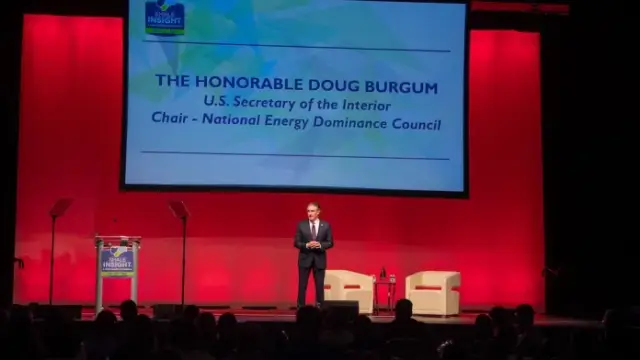ERIE, Pennsylvania — Interior Secretary Doug Burgum praised the Bayfront Convention Center in northwest Pennsylvania as an ideal venue for the recent Shale Insight Conference, which highlighted the state’s advancements in manufacturing, energy, and technology.
The conference featured 81 exhibits from global vendors showcasing their innovations.
Burgum, who toured a shale platform earlier this spring, told the Washington Examiner that Pennsylvania has established itself as a national energy leader, ranking second only to Texas in natural gas production. “Over 20% of the U.S. natural gas is now coming from Pennsylvania, and natural gas is the fastest-growing component of energy in the world,” he stated.
He described natural gas as “a flexible, diverse, powerful tool,” noting its transportability due to the developing LNG infrastructure in the U.S. This infrastructure benefits not only producers but also workers and farmers leasing land to energy companies.
Burgum emphasized that LNG exports have contributed to keeping inflation in check, affecting everything from heating and electricity to food and fuel costs.
For years, geologists recognized the presence of shale in western Pennsylvania, but its potential as a significant natural gas source was underestimated until 2003. That year, Range Resources pioneered horizontal drilling and hydraulic fracturing, leading to the first commercially viable well and attracting numerous oil and gas companies to the region.
A report from the Marcellus Shale Coalition estimated that the natural gas industry in Pennsylvania supported 123,000 jobs in 2022, with average salaries around $97,000, including direct and supply chain-related jobs.
Burgum remarked, “The shale revolution’s literally a revolution that has transformed the American economy, and it’s put us in a position where we can execute President Trump’s vision, which is prosperity at home and peace abroad.”
During his recent trip to Europe with Energy Secretary Chris Wright, Burgum discussed the importance of reducing reliance on Russian and Iranian oil and gas to combat terrorism, stating, “One of the ways to stop wars is to stop having our allies buy energy from our adversaries.” He highlighted the critical role of energy abundance from Pennsylvania in this strategy.
He also mentioned that winning the artificial intelligence arms race is a top priority for the administration. “It’s absolutely essential to win the AI arms race. We’ve got the software, we have the technology, we have the chips, we have a lead in all that, but it’s also a battle for who can produce the most electricity,” he explained, noting China’s rapid expansion in electricity production across various sources.
Burgum advocated for converting natural gas to electricity as the quickest method to generate additional power, which can subsequently be utilized for AI development. “Pennsylvania’s going to play a huge role in that, but so is the Permian or any place that we’ve got stranded gas or excess gas,” he said.
He pointed out that states with smart energy policies, like Pennsylvania, are thriving, while neighboring regions lacking such policies are missing out on investment opportunities. “No one’s going to put an artificial intelligence factory in a state that’s got electric prices that are two to three times higher than the neighboring state,” he warned, emphasizing that affordable electricity is crucial for attracting AI-related investments.
 Telegram is where we really talk. Don't miss out!
Telegram is where we really talk. Don't miss out!








